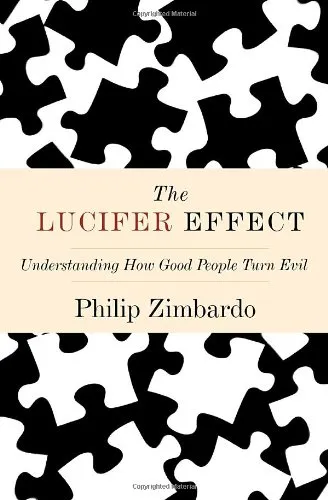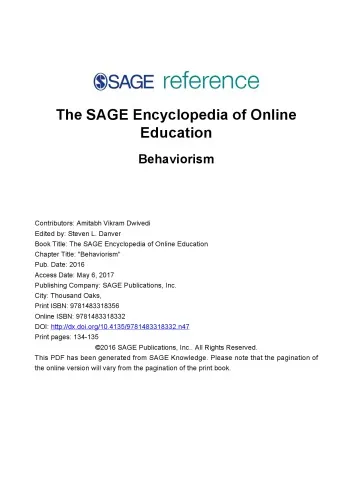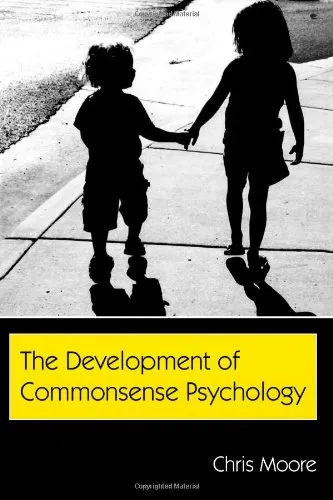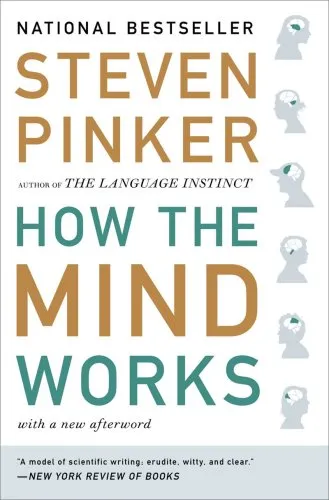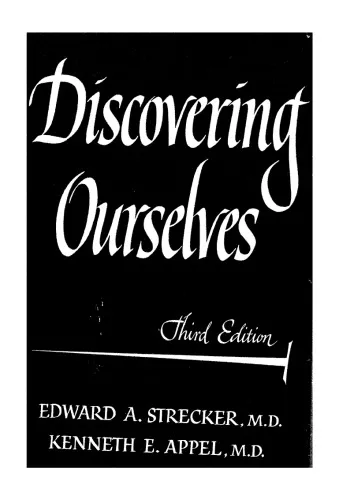The Lucifer Effect: Understanding How Good People Turn Evil
4.5
بر اساس نظر کاربران

شما میتونید سوالاتتون در باره کتاب رو از هوش مصنوعیش بعد از ورود بپرسید
هر دانلود یا پرسش از هوش مصنوعی 2 امتیاز لازم دارد، برای بدست آوردن امتیاز رایگان، به صفحه ی راهنمای امتیازات سر بزنید و یک سری کار ارزشمند انجام بدینکتاب های مرتبط:
مقدمهای بر کتاب The Lucifer Effect
کتاب The Lucifer Effect: Understanding How Good People Turn Evil نوشته فیلیپ زیمباردو، اثری است که به بررسی یکی از پیچیدهترین جنبههای رفتار انسانی یعنی چگونگی تبدیل انسانهای خوب به اعمال شرورانه میپردازد. فیلیپ زیمباردو، یک روانشناس شناختهشده جهانی، در این کتاب از تجربیات و تحقیقات شخصی خود بهره میگیرد تا به عمق این مسئله پرداخته و زوایای مختلف آن را مورد بررسی قرار دهد.
خلاصهای جامع از کتاب
کتاب The Lucifer Effect با مرور و تحلیل دقیق آزمایش Stanford Prison Experiment آغاز میشود که زیمباردو خود در اوایل دهه ۱۹۷۰ میلادی آن را طراحی و اجرا کرد. این آزمایش بر روی گروهی از دانشجویان دانشگاه استنفورد صورت گرفت که به صورت گروهی به نقشهای زندانی و نگهبان تقسیم شدند. در طول چند روز، شرایط و دینامیک گروهی باعث شد تا نگهبانان به اعمال خشونتآمیز و غیرانسانی اقدام کنند. این بخش از کتاب توضیح میدهد که چگونه نقشهای اجتماعی و محیط میتوانند رفتار انسانها را تحت تأثیر قرار دهند.
در ادامه، زیمباردو به تحلیل عمیقتری از عوامل روانشناختی و اجتماعی میپردازد که میتواند به تغییرات رفتاری افراد منجر شود. او به مفهوم Deindividuation (غیرشخصیتیابی) و تاثیر آن در تضعیف هویت شخصی و مسئولیتپذیری اجتماعی اشاره میکند. همچنین، بحثهایی در مورد قدرتهای ساختاری و تاثیر آن بر فرآیند تصمیمگیری و اعمال فردی مطرح میشود.
نکات کلیدی کتاب
- تاثیر نقشهای اجتماعی و محیط بر رفتارهای فردی
- بررسی مفهوم Deindividuation و پیامدهای آن
- قدرتهای ساختاری و تاثیر آنها بر رفتار فردی و اجتماعی
- چگونگی جلوگیری از وقوع رفتارهای شرورانه با ارتقای هوش اخلاقی
نقلقولهای معروف از کتاب
"قدرت برتر میتواند ذهنها را اسیر کند و قلوب را خاموش سازد، حتی در کسانی که به نیکویی شهرهاند."
"تغییر انسانها به سوی شروری، نادانی اخلاقی نیست، بلکه نتیجه شرایط و سیستمهای فاسد است."
چرا این کتاب مهم است
کتاب The Lucifer Effect نه تنها یک تحلیل علمی و دقیق از رفتار انسانی ارائه میدهد، بلکه به پرسشهای اساسی درباره ماهیت اخلاق و روان انسانی پاسخ میدهد. در دنیایی که همواره با اخبار جرایم و خشونتهای غیرانسانی روبرو هستیم، این کتاب به ما نشان میدهد که چگونه میتوان به شناخت بهتر از خود و محیط پیرامون رسید تا از تکرار چنین اعمالی جلوگیری کنیم.
به علاوه، فیلیپ زیمباردو با استفاده از نتایج تحقیقاتش پیشنهاداتی برای تقویت اخلاق کودک و جلوگیری از اعمال خشونتآمیز در جامعه ارائه میدهد که میتواند برای سیاستگذاران و مربیان آموزشی بسیار کاربردی باشد.
The Lucifer Effect: Understanding How Good People Turn Evil
"The Lucifer Effect: Understanding How Good People Turn Evil" by Philip Zimbardo offers a profound exploration of the forces that cause ordinary people to engage in seemingly inexplicable acts of brutality and evil. Rooted in Zimbardo's landmark Stanford Prison Experiment, the book delves deep into the psychological mechanisms that can transform moral individuals into perpetrators of wickedness.
Detailed Summary of the Book
At the core of "The Lucifer Effect" is the detailed account of the Stanford Prison Experiment, conducted in 1971, where college students were assigned roles as guards and prisoners in a simulated prison environment. The experiment demonstrated the ease with which individuals could embrace severe behaviors when placed in environments that facilitated such transformations. Zimbardo's work expands on these findings by analyzing historical, social, and military contexts, such as the abuses at Abu Ghraib prison, to illustrate similar dynamics on larger scales.
The book systematically explores the complex interplay of situational variables, systemic structures, and individual dispositions. Zimbardo presents the shocking thesis that anyone is capable of evil under the right circumstances, dissolving the clear line often perceived between good and evil. He emphasizes that understanding context, rather than inherent trait deficiencies, is crucial to comprehed how and why people can commit evil acts. The exploration also extends into personal responsibility, wherein Zimbardo addresses how individuals can resist negative influences and make ethically sound decisions, even under pressure.
Key Takeaways
- The power of situational and systemic factors often outweighs individual morality and decisions.
- Ordinary people can commit extraordinary acts of evil under extreme circumstances.
- Awareness and understanding of these influences can create avenues for personal and societal resilience against evil.
- Cultivating self-awareness and ethical vigilance is essential for resisting social and situational pressures.
Famous Quotes from the Book
“The line between good and evil is permeable and almost anyone can be induced to cross it when pressured by situational forces.”
“Evil is knowing better but willingly doing worse.”
Why This Book Matters
"The Lucifer Effect" remains a significant work in understanding human behavior and ethics. By shedding light on the correlations between individual actions and overarching systems, Zimbardo's work serves as a critical resource for psychologists, sociologists, educators, and policymakers alike. The book is a clarion call for encouraging empathy and fostering environments where human dignity is upheld and safeguarded against deteriorating moral standards. As new instances of moral failing continue to appear across different sectors worldwide, the insights from "The Lucifer Effect" are more relevant than ever, emphasizing prevention by systemic change and the promotion of ethical responsibility.
دانلود رایگان مستقیم
شما میتونید سوالاتتون در باره کتاب رو از هوش مصنوعیش بعد از ورود بپرسید
دسترسی به کتابها از طریق پلتفرمهای قانونی و کتابخانههای عمومی نه تنها از حقوق نویسندگان و ناشران حمایت میکند، بلکه به پایداری فرهنگ کتابخوانی نیز کمک میرساند. پیش از دانلود، لحظهای به بررسی این گزینهها فکر کنید.
این کتاب رو در پلتفرم های دیگه ببینید
WorldCat به شما کمک میکنه تا کتاب ها رو در کتابخانه های سراسر دنیا پیدا کنید
امتیازها، نظرات تخصصی و صحبت ها درباره کتاب را در Goodreads ببینید
کتابهای کمیاب یا دست دوم را در AbeBooks پیدا کنید و بخرید
1457
بازدید4.5
امتیاز0
نظر98%
رضایتنظرات:
4.5
بر اساس 0 نظر کاربران
Questions & Answers
Ask questions about this book or help others by answering
No questions yet. Be the first to ask!
